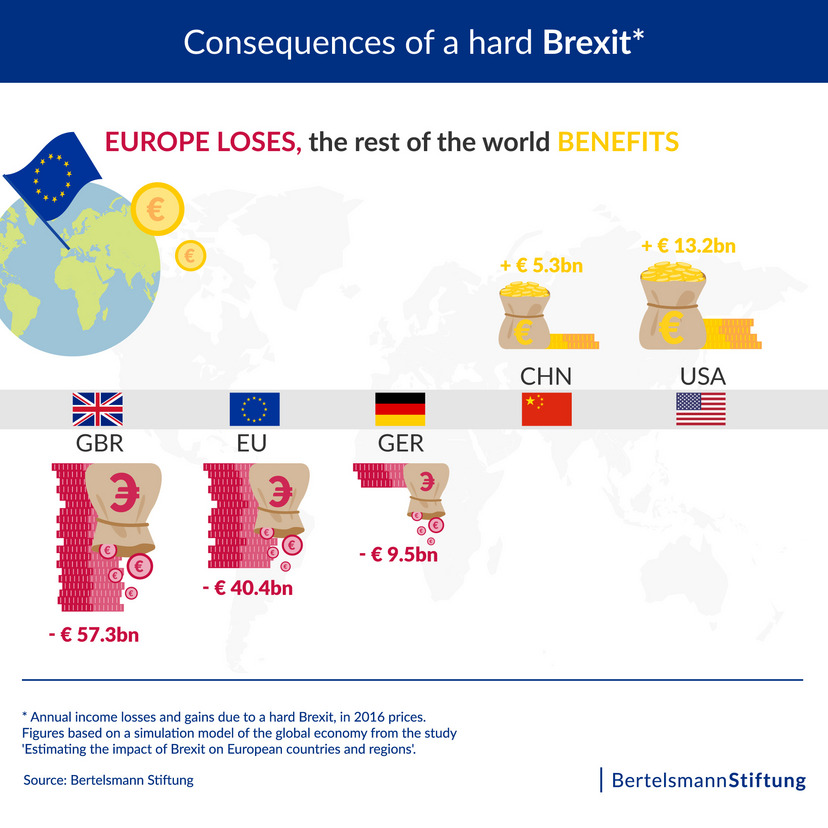Nearly three years after the initial EU referendum took place, it is still uncertain how Brexit will be executed. But one thing is clear: trade in goods and services would become more expensive, the uncertainty will burden many firms. This puts pressure on competition, consumption and investment – especially in the absence of a withdrawal agreement between the UK and the EU. Citizens in EU countries (excluding the UK) would have to bear income losses of 40 billion euros per year with a hard Brexit. The British themselves would be hit hardest by a "No-Deal-Brexit": UK citizens would suffer income losses of 57 billion euros per year (around 900 euros per capita). In Germany, too, the loss of income due to a hard Brexit would be high at around 10 billion euros per year. This would make the loss of income in Germany the highest in Europe, after the UK. France and Italy would also see significant income losses amounting to billions of euros.
![[Translate to English:] Kleine Würfel mit der Flagge der EU und der Großbritanniens.](/fileadmin/files/_processed_/6/2/csm_1508599407AdobeStock_172148161_KONZERN_ST-EZ_02bf9d2fa9.jpg)
© tostphoto - stock.adobe.com
Brexit to cost EU citizens up to 40 billion euros annually
Our new study examines the impact of Brexit on incomes in Europe. It shows that the British would have to shoulder the biggest income losses. But in export-oriented countries like Germany and France, Brexit would cost citizens billions of euros. The US and China, on the other hand, could even benefit from the British withdrawal.
"Brexit could seriously damage the foundations of the world's largest economic area. Brussels and London must do everything they can to achieve an agreement."
Aart De Geus, Chairman Executive Board Bertelsmann Stiftung
For the analysis, economists Giordano Mion of the University of Sussex and Dominic Ponattu our economic expert, analyzed data on global trade flows to predict the consequences of a Brexit. The study provides results for around 300 regions in Europe. The income losses are expressed as gross domestic product per year (and per inhabitant).
Soft brexit reduces income losses
A so-called soft Brexit could greatly mitigate the negative consequences. The authors show that a soft Brexit could halve the loss of income for Germany to five billion euros compared to a hard Brexit. In the UK, the losses of around 32 billion euros would also be considerably lower than for a hard Brexit (57 billion euros). The entire EU, excluding the UK, would incur annual income losses of around 22 billion euros in a soft Brexit scenario.
While Europe suffers, the US and China could profit from Brexit
The study also shows that some countries outside Europe could benefit from Brexit. According to the simulations, US incomes would benefit from a hard Brexit and could rise by around 13 billion euros annually. In China, incomes would rise by around five billion euros annually, in Russia a slight increase of around 260 million euros annually would be expected due to Brexit. "European value chains are negatively affected by Brexit. This would make trade within Europe more expensive and trade with the rest of the world could become more attractive." says Ponattu.

Bertelsmann Stiftung
This graphic shows the consequences of a hard Brexit: Europe loses and the rest of the world benefits.
Regions with strong industry and trade among the biggest losers
According to the analysis, regions in the south of England in particular would suffer the most from the consequences of a hard Brexit. This is also due to the geographical proximity and the close trade relations to the European mainland. London would be hardest hit by a hard Brexit, followed by Berkshire and Surrey. In the region of London alone the loss of income for all inhabitants would be more than five billion euros per year. In Germany, the administrative districts of Dusseldorf and Cologne would be affected the most. In these regions, the authors expect income losses totaling 650 million euros (Dusseldorf) and 560 million euros (Cologne) per year – these figures correspond to around 126 euros per inhabitant per year with a hard Brexit. The government districts of Upper Bavaria (with the greater Munich area) would follow with an expected loss of 526 million euros per year (115 euros per capita) in income.
After the UK and Germany, France and Italy would record the largest income losses: For the French, losses in income would amount to almost eight billion euros and for the Italians to four billion euros each year. Brexit would seriously affect especially citizens in Ireland: According to the authors, it would cost the Irish 720 euros per capita and year (around 3.5 billion in total). The Netherlands would also be severely affected given its relatively small population, but with over three billion euros in income losses.
High losses in absolute terms must also be seen in relation to a region’s overall economic strength and trade relations. For example, Manchester in the UK would see high income losses in absolute terms due to a hard Brexit – but given its high economic output, the percentage losses in income there would be in the lower middle range. The same principle applies to the German state of Bavaria. A hard Brexit would be painful for the export-oriented state. But the widely spread, diversified worldwide trade relations of Bavarian companies could partially offset the loss of income.
Brexit weakens productivity and competition – Regions with SMEs severely affected
The main drivers of the losses are higher price mark-ups and lower productivity as a result of Brexit: new tariffs, currently abolished in the EU single market, would make goods and services more expensive. Weaker trade with the UK would also lead to price premiums, as competition for the best products in Europe could decline in many sectors. At the same time, firm productivity could grow more slowly as incentives for new investment and product innovations are reduced. Both weaker competition and low productivity growth could eventually lead to higher prices and slower wage growth.
Additional information
The study "Estimating the impact of Brexit on European countries and regions" examines the economic impact of a hard and soft Brexit scenario at the level of the 28 EU member states as well as in the 276 EU regions (NUTS2 level). The study uses a modern "gravity model" of international trade that also takes into account countries’ and regions’ trade volume and distance from trading partners in its assessment of the economic effects of trade. The analysis uses latest data on international trade flows to examine the effects of Brexit on income changes, productivity and price markups. To this end, the study estimates the positive effects of the EU single market on the economic development of countries and regions and simulates how rising trade costs through Brexit would affect countries and regions. For the soft Brexit scenario, Brexit diminishes the positive trade effect of the single market, but that some portion of the positive effect of trade integration with the UK still exists in this scenario. In the hard Brexit scenario, the analysis assumes that an exit of the UK without a deal would not preserve any portion of the positive effect of the single market on trade flows between the UK and EU countries.
Further Information will be found here.



